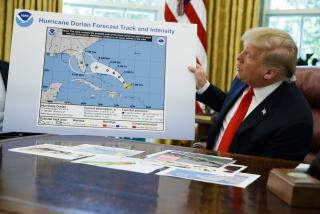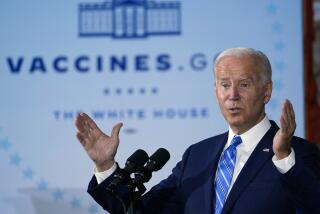Opinion: Coronavirus liability waivers are coming. Here’s what you should know before signing them

The Trump campaign took some well-deserved flak this week for scheduling a massive COVID-19 transmission party in Tulsa, Okla., on June 19. Perhaps recognizing the risk of bringing more than 19,000 people to scream and shout together in an enclosed space for more than an hour, the campaign demands that attendees waive their right to sue the campaign, the rally site and any employees or volunteers for the harm that may ensue.
“By clicking register below, you are acknowledging that an inherent risk of exposure to COVID-19 exists in any public place where people are present,” the campaign tells people attempting to obtain tickets to the event. “By attending the Rally, you and any guests voluntarily assume all risks related to exposure to COVID-19 and agree not to hold Donald J. Trump for President, Inc.; BOK Center; ASM Global; or any of their affiliates, directors, officers, employees, agents, contractors, or volunteers liable for any illness or injury.”
Naturally, we in the Fake News Industry pounced on Trump for putting MAGA-ites in harm’s way and then ducking responsibility for it. But some reporters also observed that the steps the president’s campaign is taking reflect the lawsuit anxiety felt by many businesses as governments lift their stay-at-home orders. Sure enough, in my email Friday morning was a note from the YMCA of Metropolitan Los Angeles, telling me that it was reopening soon but demanding new liability waivers from its members that specifically acknowledge the risks posed by COVID-19.
Which made me wonder whether we’re going to be handed these waivers everywhere we try to go, and whether we have any choice in the matter. The answer is, not every business can demand them, and how much choice you have depends on how essential the product or service being offered is.
According to Timothy D. Lytton, a law professor at Georgia State University College of Law, the courts have imposed three basic limits on liability waivers. First, you can’t assume risks you don’t know about; second, you have to assume the risk voluntarily; and third, the waiver has to be consistent with public policy. That’s why, for example, local supermarkets couldn’t insist that all shoppers sign waivers before buying food, and businesses couldn’t enforce waivers that shielded their gross negligence, Lytton said.
(Employees and workplace-based waivers are a special category, given that on-the-job injuries and illnesses are covered by workers compensation insurance instead of the tort system. Here’s a good explanation for why employers would have a hard time forcing workers to sign COVID-19 liability waivers in order to go back to work.)
I don’t like “Gone With the Wind,” but I know how few artistic opportunities McDaniel had at her disposal in the ‘20s and ‘30s, and how important the movie was to her.
Those limits still leave plenty of room for operations like the Y that offer non-essential goods and services to insist on liability waivers that protect them against claims of basic negligence — that is, failing to take reasonable care to protect customers against harm, as opposed to deliberately or recklessly exposing them to illness and injury. Should we just sign them and move on, assuming it’s a small price to pay in order to help get the economy going again?
As the saying goes, where you stand on this issue depends on where you sit. The way that the U.S. Chamber of Commerce and its allies in Congress see it, businesses are deterred from reopening because they fear tort lawyers will file frivolous lawsuits on behalf of the customers who will invariably contract COVID-19, and not necessarily from their business. Consumer advocates counter that responsible businesses are well protected from bogus claims under current law, noting how hard it will be for customers to prove where, exactly, they were infected.
So far, the supposed wave of COVID-19 lawsuits looks more like a gentle ripple. An online tally kept by the Hunton Andrews Kurth law firm shows 186 complaints filed on behalf of consumers since the pandemic took off in February, but only nine at most were from people claiming they were harmed by exposure to COVID-19 in a public place. The vast majority were for losses caused by cancelations and postponements or by false advertising. Close to 200 lawsuits, meanwhile, have been filed by businesses and groups challenging stay-at-home orders.
In Lytton’s view, you’re giving up a lot if you waive your right to sue for negligent acts. “Simple forms of negligence are the most likely risks,” he said. For example, the operator of a public pool may put in place a number of sensible policies to guard against COVID-19 transmission, but there’s still the risk that the lifeguards won’t diligently carry them out. Their negligence is what ultimately would lead to your hospitalization.
At the same time, Lytton said, businesses that know their customers are all signing waivers have less incentive to be careful. The threat of a lawsuit is what protects consumers.
The debate is playing out now in Congress, where the Chamber is pushing for a broad, multi-year liability shield against COVID-19 lawsuits. Senate Majority Leader Mitch McConnell (R-Ky.) has said that liability protections must be part of any new relief bill, and while some Democrats support targeted liability limits, they generally oppose what McConnell has advocated.
In the meantime, expect more waivers to pop up as you start to resume the activities you stopped after the shutdown orders took effect. Here’s Lytton’s rule of thumb: “If you don’t have to do it, then it’s a bad idea to sign it.” And if you have little choice but to sign — because the product or service is essential, or you’re compelled to sign — “it’s pretty much unenforceable.”
More to Read
A cure for the common opinion
Get thought-provoking perspectives with our weekly newsletter.
You may occasionally receive promotional content from the Los Angeles Times.











